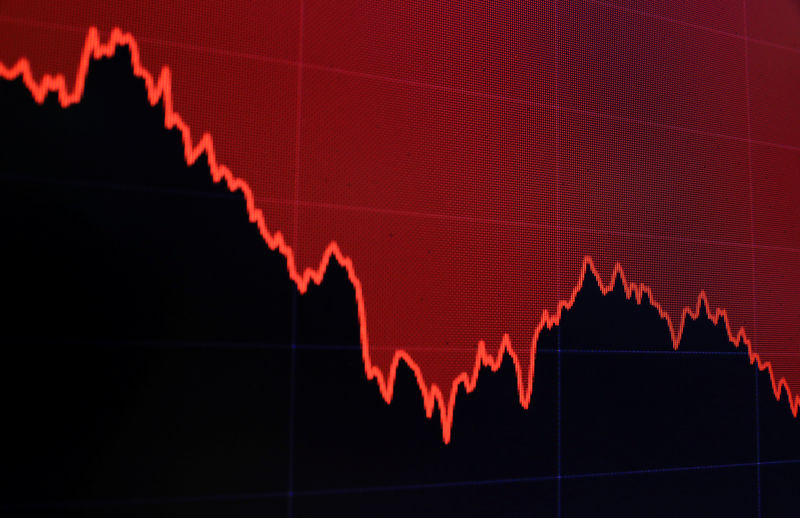By Rahul Karunakar and Hari Kishan
BENGALURU (Reuters) - An end to the bull run in global stocks is not far away, according to a Reuters poll which also showed a broad cut to forecasts for next year on concerns over global growth and tightening financial conditions.
World stocks tested lows at the end of October during a brutal rout that wiped off trillions of dollars of market value, driven by a U.S.-led trade war and a hawkish Federal Reserve.
The recent turbulent sell-off in stocks is more or less over, according to nearly 250 equity strategists polled Nov 13-28. But they mostly said 2018 would end up a forgettable year with most markets set to finish off in the red.
While all but one of the 17 stock market indexes polled are forecast to gain by end-2019 from now, about half were not expected to recoup this year's losses. Strategists also lowered their outlooks compared to three months ago, when almost everyone missed the recent rout.
Shanghai Composite index was the only exception, where strategists raised their outlook from three months ago. But even China stocks will not completely recoup this year's losses of more than 20 percent by end-2019.
The latest predictions for most stock indexes were below what strategists penciled in early this year and clearly show the blistering rallies of 2017 are well in the rear-view mirror.
The risks that have driven stocks lower recently - trade tensions, Brexit negotiations, trouble in emerging markets - could hurt the U.S. financial system, the Fed said in a first-ever report devoted to financial stability.
Still, over 40 percent of strategists who answered an additional question, 48 of 110, said the current bull run in global stocks has more than a year to go. About 25 percent expect it to end within a year.
But nearly a third of respondents said the bull market has already ended.
"While volatility will remain elevated - we've seen two 10 percent corrections this year already - we don't feel that a true bear market will begin until we are in a recession or entering a recession," noted Mona Mahajan, investment strategist at Allianz (DE:ALVG) Global Investors.
"We don't expect a recession in the U.S. over the next 12 month period. That being said, markets do start to price in recessions one to six months prior, so we could technically see a bear market start to emerge towards the end of next year."
Fears the U.S.-China trade war will escalate even further have left Wall Street strategists less optimistic about gains the S&P 500 makes next year, but they still expect the index to close higher next year from here.
"While the cycle isn't over until it's over, building in strong defenses now will help navigate late-cycle volatility and uncertainty," noted Richard Lacaille, global chief investment officer at State Street (NYSE:STT) Global Advisors.
"Although the S&P 500 marked its longest bull run in August 2018, a severe correction in October reminded us that we are closer to the end of the cycle than the beginning and that investors should be prepared for heightened volatility."
(Reuters poll graphic on equity bull run: https://tmsnrt.rs/2P7uu0w)
Slowing economic growth, political risks and worries over Washington's protectionist policies will keep a lid on key European stock markets in 2019.
After a bruising year so far, Britain's top stock index will recover some ground in 2019 but gains will be much more subdued than previously thought as investors try to navigate the country's pending split from the European Union.
While trade worries, concerns about China's economic slowdown and currency volatility are expected to persist, emerging market stocks, which have had a very difficult year, were forecast to outperform equities in developed economies.
Major Latin American bourses are forecast to extend a recent rally into 2019, led by Brazil's Bovespa stock index, which is forecast to gain over 25 percent by end-2019 from here.
But the outlook for Indian stocks was downgraded for the first time this year.
Despite a sharp fall in global equities in recent months only about 27 percent of nearly 120 strategists responding to a question described their local market as cheap. Around 40 percent said it was fairly priced and about a third said they were expensive.
While many companies globally have missed profit estimates and several have also lowered their outlook broadly, a majority of strategists who answered a separate question - 64 of 114 - said company earnings growth has not peaked. The remaining 50 respondents said it already has.
"The earnings growth rate has peaked, but the absolute level of earnings should continue to increase over the coming year as solid sales growth should continue to drive earnings at a lower, more sustainable pace," said Sameer Samana, senior global market strategist at Wells Fargo (NYSE:WFC) Investment Institute in St. Louis, referring to the S&P 500.

(Reuters global stock markets poll graphic: http://tmsnrt.rs/2nHJiJ9)
(Additional reporting and polling by correspondents in Bengaluru, London, Mexico City, Milan, Moscow, New York, Sao Paulo, Shanghai, Tokyo and Toronto; Editing by Ross Finley and Chizu Nomiyama)